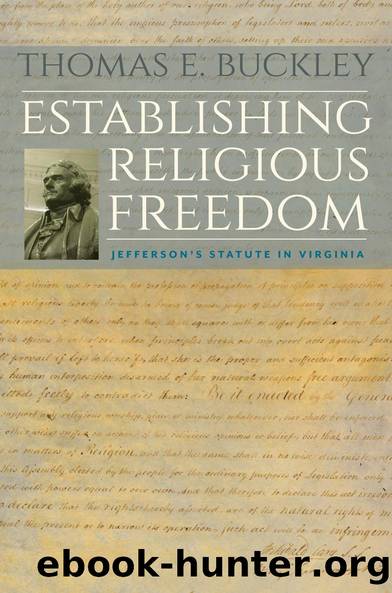Establishing Religious Freedom by Thomas E. Buckley

Author:Thomas E. Buckley [Buckley, Thomas E.]
Language: eng
Format: epub
Tags: History, United States, Revolutionary Period (1775-1800)
ISBN: 9780813935041
Google: tdV6AAAAQBAJ
Publisher: University of Virginia Press
Published: 2014-01-13T03:09:22+00:00
Evangelical Issues in Politics
Yet practically from the beginning of the Republic, a symbiotic relationship existed between religion and politics. Alexis de Tocquevilleâs classic comments are well known, but he was not the only European observer impressed by the voluntary character of religion in America. The Bavarian émigré Francis Grund commented on the same phenomenon in the 1830s. He singled out the abundance of ministers, their energy in preaching Christianity in a variety of denominations, and most remarkable, the laityâs willingness âto pay for it.â31 From his perspective âreligion has been the basis of the most important American settlements; religion kept their little community together, religion assisted them in their revolutionary struggle; it was religion to which they appealed in defending their rights, and it was religion, in fine, which taught them to prize their liberties.â âThe Americans look upon religion as a promoter of civil and political liberty,â he wrote, and they âhave, therefore, transferred to it a large portion of the affection which they cherish for the institutions of their country.â
Grund drew the inevitable contrast with Europe, where âliberalâ forces strove to weaken religionâs influence. In the United States, however, the government depended upon religion: âIts promotion is essential to the constitution. . . . Whatever is calculated to diminish its influence and practice has a tendency to weaken the government, and is consequently opposed to the peace and welfare of the United States.â Morality rested upon religion; and by morality, Grund meant a personâs âmoral conduct,â which he equated with âprivate virtue.â On the whole he thought that Europeans were much more forgiving of the private peccadilloes of their artists, politicians, soldiers, and even clergy because of the overall good they bestowed upon society. The same was not true in America, where âprivate virtue overtops the highest qualification of the mind, and is indispensable to the progress even of the most acknowledged talents.â32 By religion he meant Christianity, a religion of âthe heartâ that focused on âLove and charityâ and emphasized Christâs redemptive sacrifice âin dying for the sins of this worldâ; in short, evangelical religion and its concern for the kind of Christian lifestyle and behavior that would merit admission to the communion table.33
By the first decades of the nineteenth century, Virginians were well aware of these evangelical concerns and the pressure that churches and religious groups could bring to bear on legislation. Evangelicals had recognized that civil authorities could serve as a major support for their version of Christian morality, and they did not hesitate to seek assistance from state and local governments. Indeed, these expectations represented continuity with the church-state relationship under the colonial establishment. Thus in 1784 Hanover Presbytery requested legislative support for âpreserving . . . the public Worship of the Deity,â and the next year the Baptists petitioned the assembly to support Christianity by passing âthose laws of Morality, which are necessary for Private and Public happiness.â34 Virginiaâs evangelicals saw no contradiction between these requests and Jeffersonâs statute. Nor did the lawmakers.
Other petitions urged the enforcement of laws against âVice and Immorality.
Download
This site does not store any files on its server. We only index and link to content provided by other sites. Please contact the content providers to delete copyright contents if any and email us, we'll remove relevant links or contents immediately.
| Civil Rights | Discrimination |
| General | Human Rights |
Day by Elie Wiesel(2252)
The Age of Genius by A. C. Grayling(2177)
Gideon's Spies: The Secret History of the Mossad by Gordon Thomas(1956)
The Gulag Archipelago (Vintage Classics) by Aleksandr Solzhenitsyn(1732)
FATWA: Hunted in America by Pamela Geller(1726)
Columbine by Dave Cullen(1505)
Examples & Explanations: Administrative Law by William F. Funk & Richard H. Seamon(1334)
Men Explain Things to Me by Rebecca Solnit(1323)
The Rule of Law by Bingham Tom(1323)
Anatomy of Injustice by Raymond Bonner(1273)
Three Cups of Tea by Greg Mortenson(1264)
ADHD on Trial by Michael Gordon(1247)
That Every Man Be Armed by Stephen P. Halbrook(1244)
Gideon's Spies by Gordon Thomas(1219)
Palestinian Walks by Raja Shehadeh(1145)
The Source by James A. Michener(1140)
Fast Times in Palestine by Pamela Olson(1123)
Nothing to Envy by Barbara Demick(1045)
Constitutional Theory by Carl Schmitt(1042)
